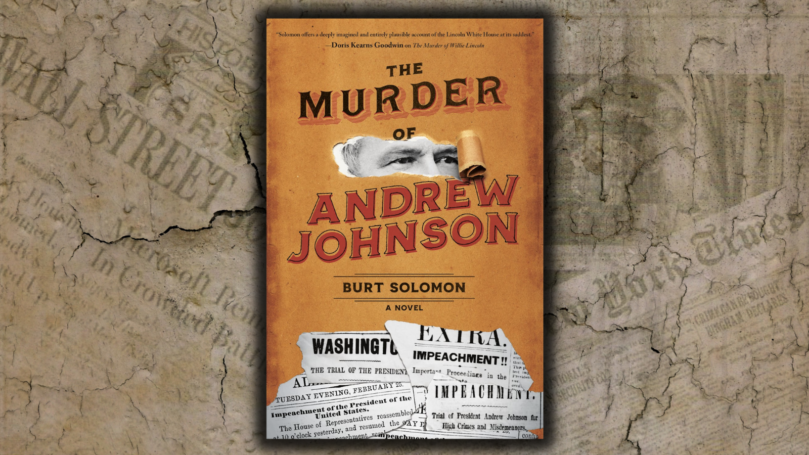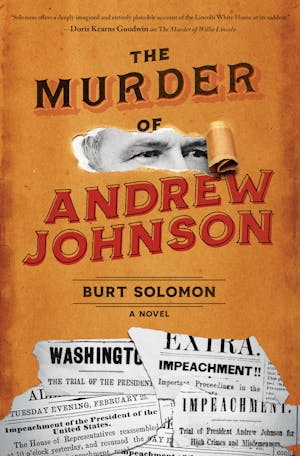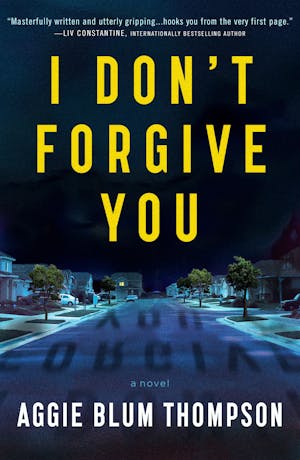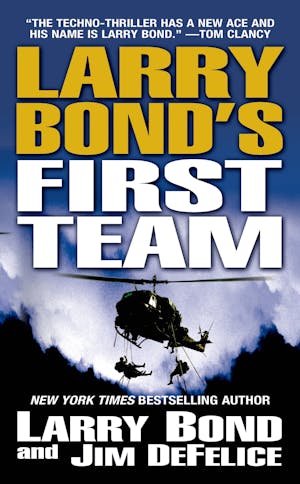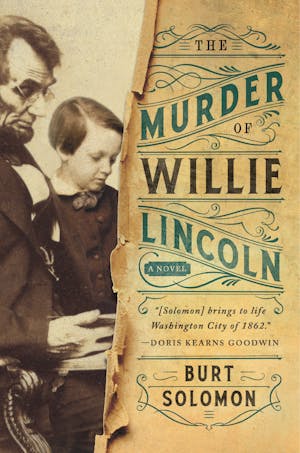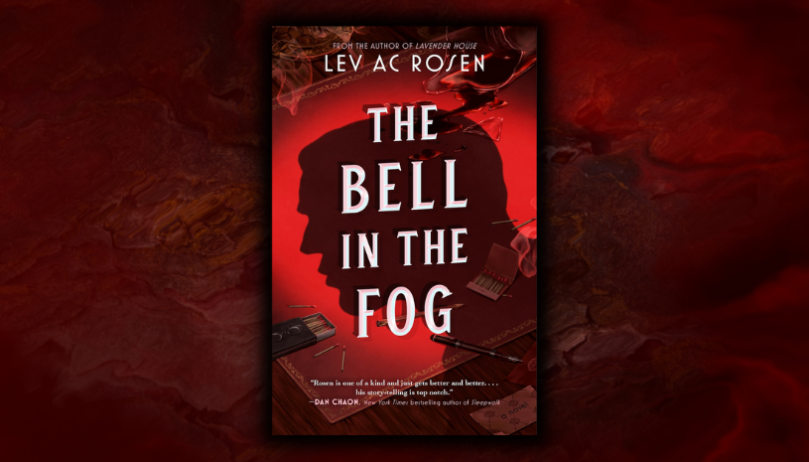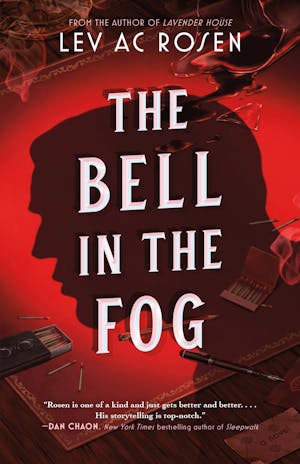 The Bell in the Fog, a dazzling historical mystery by Lev AC Rosen, asks—once you have finally found a family, how far would you go to prove yourself to them?
The Bell in the Fog, a dazzling historical mystery by Lev AC Rosen, asks—once you have finally found a family, how far would you go to prove yourself to them?
San Francisco, 1952. Detective Evander “Andy” Mills has started a new life for himself as a private detective—but his business hasn’t exactly taken off. It turns out that word spreads fast when you have a bad reputation, and no one in the queer community trusts him enough to ask an ex-cop for help.
When James, an old flame from the war who had mysteriously disappeared, arrives in his offices above the Ruby, Andy wants to kick him out. But the job seems to be a simple case of blackmail, and Andy’s debts are piling up. He agrees to investigate, despite everything it stirs up.
The case will take him back to the shadowy, closeted world of the Navy, and then out into the gay bars of the city, where the past rises up to meet him, like the swell of the ocean under a warship. Missing people, violent strangers, and scandalous photos that could destroy lives are a whirlpool around him, and Andy better make sense of it all before someone pulls him under for good.
The Bell in the Fog will be available on October 10th, 2023. Please enjoy the following excerpt!
CHAPTER ONE
There’s a crowd at the bar when I get inside, but I hang back, alone, and watch. There’s a bucket swinging in my hand, rusted tin, filled with pinkish water, and my hands are dyed red. They match the walls of the Ruby, though it’s so packed tonight, you can barely see the diamond wallpaper through the crowd. A constant hum of people talking over one another fills the room, pierced by a loud laugh here and there, like the church organ shrieking over the choir.
A few people stare at me—I don’t know if it’s the bucket or just knowing who I am, but they don’t say anything. They look away, quick, back at a friend, or the stage, where the band plays “It’s No Sin,” the female impersonator’s voice struggling to be heard.
People are dancing anyway, hands clasped, bodies close, men with men, women with women, some men with women, even. I haven’t seen a mixed gay bar since the war, when women needed men to escort them in. All colors of people, too. Elsie has really gotten word out that the Ruby is the most welcoming queer bar in San Francisco.
Except maybe for me. News has trickled out about me, too— the gay PI with the office above the Ruby—but with it so has my past, and no one at a gay bar wants to get too close to a cop, even if he was kicked off the force for being caught in one. Especially not when he’s holding a bucket of what looks like blood.
I push my way through the people who won’t look at me, trying to be delicate, making sure the bucket doesn’t spill, and walk over to the bar. Gene is pouring out drinks with steady hands that were trained for the scalpel before someone sent photos of him and a beau to his medical school. He looks gorgeous in the light. He glows. I know I should probably try talking to him more. But our kiss was months ago, and I was broken and bloody and glad to be alive. Since then, whenever I’ve gotten up the nerve to talk to him, he’s smiled and laughed, same as he has with any other customer.
He looks down at the bucket I’m holding, and frowns.
“Need the sink?” he asks.
“If that’s all right. I’m afraid I’ll spill it if I try to bring it upstairs.”
He moves to the left, making space for me, and I squeeze in next to him. Our shoulders touch and for a moment I think of asking him to dance, what that would be like, being out on the floor with him, shoulder to shoulder, arms around his waist. Like I belonged, I think. Like I was home.
I pour the red water out, and it sloshes loudly into the sink.
“That’s not blood, is it?” a patron asks, watching. He’s drunk enough to talk to me.
“Paint,” I say. “Someone wrote some not-nice things on the building a few weeks back. No one else had time yet, so I washed it off.”
“Aren’t you supposed to be a detective?”
I shrug, not sure how to answer. The motion tilts the bucket a little harder and the last of the red water splashes back on me, hitting me in the face. The patron laughs as Gene hands me a towel.
“He is a detective,” Gene says, as I wipe my face off, hiding my smile. I hand the towel back to him.
“Thanks,” I say, and go to wash my hands off, too. I scrub, and the paint won’t shift. My hands stay stained.
“Want a drink?” Gene asks.
“No,” I say. “Thanks.” I stand next to him a moment longer until he reaches past me to get a bottle and I realize I’m in the way.
I leave the bucket under the sink where it belongs and retreat to an empty table away from the bar. Gene shoots me a look when I get there, but I can’t read it—maybe he’s confused about my not wanting a drink. I try not to order drinks. Elsie said they’d be on the house, but considering I’m not bringing in much money, like she hoped I would, I’d rather not drain her cash and her liquor. I’m supposed to be paying her a percentage of my earnings from cases, but cases aren’t exactly pouring in. As a cop, they used to find me; now . . . I’m not sure how to get them. I wait in my office most nights, and sometimes someone will walk in, but most nights it’s empty, so I come down here, and stand to the side, hoping that’ll drum up business somehow. Tonight I at least got to make myself useful when one of the cocktail waitresses mentioned the graffiti. At least I cleaned up something.
Elsie sits down next to me. “Oh, will you just ask him out already?” she says, lighting a cigarette. She’s in a blue suit turned nearly purple from all the red light bouncing off the walls. Large ruby earrings sparkle from the shadows of her bob.
“What do you mean?”
“I mean it’s been months of you two making baby eyes at each other and nothing happening. If you don’t do something soon, he’s going to assume you’re not interested in him. It’s nearly October already, Andy, get to it if you want to ring in ’53 with him.”
“I don’t . . .” I shake my head and look back at him. He’s laughing at something a guy at the bar said. Maybe I’ve been making eyes at him, but has he really been making eyes at me, or just staring at my stare? “How would I even do that?”
“What?” Elsie blows out a smoke ring. “What do you mean?”
“I mean . . .” I don’t know what I mean. Two women, one in a suit, dance past us.
She sighs. “You just go up to him and ask him if he wants to get a drink.”
“He works at a bar.”
“Somewhere else.” Elsie shrugs.
“But—”
“Elsie, Stan is trying to sneak another number into his set.”
I look up at Lee, the showgirl who’s interrupted us, and check for lipstick; deep red tonight. She’s in a yellow halter-neck dress that sets off her cool onyx skin, and a black wig that’s tied back in a bun with a large yellow flower. She sees me staring, and winks. I’ve met a lot of the showgirls and -boys in passing, but Lee has been the closest to welcoming. She told me flat out that when she’s got the lipstick on, to call her miss, and when it comes off, to call him sir, and if I did that, we’d be pals. Easy enough to check. I don’t want to mess it up and have the friendliest face in the hallway, maybe the whole city, stop talking to me.
“Oy vey,” Elsie says, looking at the stage, where Stan, the female impersonator, is readying the mic for another number. “I’ll take care of it.”
“Sorry, Andy,” Lee says, “didn’t mean to steal her away.”
“It’s fine,” I say, as Elsie stands.
“You have a fella waiting in your office, by the way. Nice shoulders.”
“Sad or angry?” I ask. Those are the two types I get. Sad men, wondering if their boyfriends are cheating on them, and angry men, convinced their boyfriends are cheating on them. Cheap work, tailing men meeting other men, or going home to the wives they haven’t told anyone about, but I can’t be picky. I’m new at this, and I need to bring in whatever I can.
“Not sure.” Lee shakes her head. “I think he came up through the garage, though.” The ground floor under the club is a garage with an entrance in the alley. There’s parking down there; my car, Elsie’s, some others—but with it being out of the way and a bouncer in the stairwell keeping an eye out for the cops, it’s an easy way up to my office without even setting foot in the club.
“Better get to work, then,” Elsie says, walking away, “and ask him out.” She glances meaningfully over at Gene.
“Ask who out?” Lee asks, grinning at me. “You finally find a boy you like, Andy? It better not be Stan.”
“No,” I say quickly. “It’s . . . something else. Thanks, Lee. Sorry I won’t get to hear you sing. I’ll try to get down before your set is over.”
“You’ll hear me through the floorboards, honey,” she says, walking after Elsie, her hips swaying. Gene’s eyes flicker to mine for a moment as I pass the bar, or maybe I imagine it, and he’s just staring at a drink as he pours it. I can talk to him later. Leaving a client waiting means they have time to reconsider and walk out. Elsie hasn’t set an expiration date on this little experiment of having an in-house detective, but I must seem like a bad idea by now. I bring in enough to feed myself, sure, but her percentage is much lower than the value of renting me the space, and we both know it. How long before she decides my office and apartment were better before, as storerooms for booze?
I have to shove through the crowds, and by the time I get halfway upstairs to my office, I can hear Lee singing “How High the Moon.” The floor above the club is just a hallway from one elevator to stairs, with dark purple walls, and lined with doors, most of them open. The two closest to the elevator are my office and apartment, respectively, but the other four are the dressing rooms, doors always thrown open, the hallway bustling with performers and musicians and sometimes waitresses here on break, or fans coming to leave flowers for their favorite performers. People laugh and talk as loudly as downstairs as they paint on makeup or fake mustaches, zip up dresses, button vests. At first, the chaos worried me, but it actually feels like home, the same sort of clamor as working at the police station, only now I’m not looking over my shoulder to see if they’re realizing the truth about me.
Right now, the hall is filled with white feathers slowly floating down through the air and scattered on the floor like flower petals after a thunderstorm. I glance into one of the dressing rooms and see Walter trying to squeeze into a white dress that’s covered in feathers. Sarah, already in a full tuxedo, is trying to pull up the zipper for him, but it’s not going, and he hops up and down, hoping to make it fit, shedding feathers as he does.
“It fit last week,” he says.
“You got fat this week.”
In the next room, two female impersonators are peeling off their makeup, cackling at a joke I didn’t hear. A male impersonator is leaning against the wall, smoking. When I nod, she nods back, which is something. They never nodded back the first few months I was here. Even if they’re coming to terms with my old life, they don’t love that I’m suddenly living and working next door. Clients don’t love it, either. Even with a covert way up here, the way people gossip, you need to be careful.
But I’m the only queer detective in town, so some of them still risk it. Even when I’m not here, someone always tells me if a client shows up. It’s still uncommon enough it’s noteworthy. Not that the cases are. I’d thought I could do something here, maybe make up for who I was. But all I do is follow people, tell people who love them their secrets. I’m not helping out the way I wanted. No one even trusts me enough to ask me when they’re in real trouble. Why would they?
Elsie had the door redone when I moved in, amethyst investigations stenciled in dark purple. I don’t love the name, but I get why she chose it—being affiliated with the Ruby, being another of Elsie’s gems—it means I’m trustworthy, like the Ruby is. Most welcoming gay club in San Francisco, most welcoming gay PI, too. In theory anyway. Certainly not everyone is buying it, though, or I’d have more business. I wonder who’s desperate or angry enough to come see me tonight.
There’s a man sitting in the chair that faces my desk. His back is to me, but I can see he’s blond, broad shouldered, tall. I close the door with a click and he turns around.
Oh.
The recognition hits like an anchor that’s dropped too fast, crashing into the seabed, into both of us, sand flying up, fish fleeing, a heavy thud, and a scar on the ocean floor.
He looks just as shocked as I feel. Well, at least that’s two of us.
“I didn’t realize it would be you,” he says, almost apologetically. He stands up. “I can go. I mean, I should go.”
I think about letting him. He can drift out the door like smoke and I can go back to thinking of him as a sour memory. But I can’t be turning down clients. And . . . I want to know. What happened.
I shake my head. “No, sit down. If you’re here, there’s not many other places you can go, right?”
“Sure, but—”
“James. Don’t worry. I can help.”
I make my face calm, professional, even smile a little, though it kills me, and I go around to my side of the desk. He looks almost the same, even though it’s been seven years. He has gray creeping in at his sideburns, but is still shockingly handsome, with a square jaw and bright blue eyes that not even the dark circles can hide.
“So,” he says after a moment, and I realize he’s been looking at me the way I’ve been looking at him, finding all the changes, all the things that stayed the same. “Been a while, huh?”
I stare at him. I don’t know what to say to that. He’s the one who vanished. A faint whiff of him comes across the desk. Pine, the ocean. Just like he used to smell. For a moment, it’s like the lines in his forehead and the grays vanish, and it’s just us again, like when we were alone on base, or in the sonar cabin of the Bell, all our crewmates somewhere else. Just dim light, him, me, the sway of the ocean, our hands and bodies. He used to hold me tight when the ship really rocked. Kiss my earlobe.
I realize I haven’t said anything, and so does he. “You look well,” he says, smiling. He never could handle the silence. He always had to fill it with a grin or a joke or his mouth on mine.
“Thank you,” I say. And as I get used to this—the two of us together again—I suddenly realize there’s another presence.
“You ever hear from Helen?” he asks, as if sensing it, too.
I shake my head. “Not for years.”
Helen had been the third of our motley crew—a member of WAVES, the navy women’s auxiliary. Never went on a ship, but worked at Treasure Island, as a driver. After James vanished, though, we couldn’t make the friendship work, just the two of us. The crater he left in our lives with his sudden disappearance, with us not knowing what had happened—it was so big, too terrifying to keep sidestepping. But I don’t tell him all that. He doesn’t get to know what he left behind.
Lee’s voice comes through the floor, just like she promised, but it’s muffled, the lyrics unclear. Just the sound of a voice, and music, too foggy to have any real meaning.
“Why don’t we talk about why you’re here,” I say.
“Yeah. That’s probably better than dwelling on the past.”
“Sure,” I say. “Better than that.”
He swallows. He was barely prepared to do this, and then it was a swell of old memories that came in the door. I almost feel for him. But then I remember his bed on base, right next to mine, but empty one morning. Perfectly made. His luggage gone. His locker door hanging open, nothing inside. Not even a letter. Just emptiness waiting to be filled with fear and questions: Had they caught him? Was I next?
“I’m up for a promotion,” he says finally. “Rear admiral, lower half.”
“Oh,” I say, trying not to look like I was just slapped across the face. “Congratulations. I didn’t realize you’d stayed in the navy.”
“Well, yeah,” he says, tilting his head, confused. He used to do that a lot. “That’s why I—” He stops himself. “After the thing with the spy, the brass noticed me.”
I nod. He knew a little German from his grandmother. He’d never told anyone that—knowing German was suspicious during the war—but he overheard some supposed tourists speaking it on base, trying to get something to the mainland, and he’d reported it. He’d stumbled onto a spy, stopped a Nazi plot. But there was barely time to celebrate—the Bell left for Okinawa, our first real action since we’d enlisted, aside from escorting ships between San Francisco and Pearl Harbor.
We didn’t get back until the end of ’45. We spent our days looking for enemy subs and clearing out underwater mines around the coast—I ran the sonar, searching, and James was the captain’s secretary. But we’d known each other before that. We’d come through training together. We were always together.
His eyes look the same now. He stares at me, waiting for a reaction.
“I remember,” I say finally.
He nods, and takes out a cigarette case from his jacket pocket, offers me one, which I take. We tap our cigarettes on the desk almost in unison and then he takes out a lighter and brings it to his cigarette. Then, without even looking at me, without hesitating, he leans over the desk and lights mine, his fingers close to my mouth. I don’t even realize how intimate it is until it’s over. Old habits, memories our bodies haven’t gotten rid of, the way alcoholics undo themselves drinking any glass put in front of them without realizing.
“Well . . .” he says, and blows smoke out between his lips in a long gust, “after that, I was on officer track. Worked hard. Kept my nose clean, y’know?”
“A change for you, then?”
He laughs, but it’s sad. “Yes, well. That was the point. I mean . . . we all knew it wasn’t going to last. The . . . openness. Right? The moment we took Okinawa I knew. The rules were going to change back as soon as we won the war.” James always knew when the party was over. When to leave the bar before the raid, when to not go out at all. He said it felt like a thermometer, and the mercury was fun, release, going up up up . . . you had to leave before it hit the top. People like us, we only get our fun in doses, like junkies. Too much and you’re dead.
“Just one of your feelings?” I ask.
He nods, cigarette smoke swirling around him at the gesture, like a frame around his portrait. “After we got back it was boiling. We’d gotten away with so much. Not every homosexual, I know. But you and me, we were lucky, Captain Teller didn’t care much as long as we were good at our jobs. Some captains would have had us court-martialed just for the way we smiled at each other. With the war over, guys leaving, the navy bringing in those new shrinks to study us . . . it was time to go. No more fun for a while.” He looks at me, a little sad, and then up at the ceiling. “Anyway, that’s where I am today. Captain.”
“That’s fast,” I say. “You must have really loved the job.”
He doesn’t wince at that, and I’m not sure he was supposed to. “Well, a lot of guys left after the war, and I’d already been to college. And I’m good at it, too. I always told you I would be if they’d given me a chance. And now there’s this rear admiral spot. My name is being tossed around, now that Michaelson is retiring.”
He pauses, takes a hit off his cigarette.
“Except?” I ask. “Someone make the captain spill about us?”
“Oh, no, I don’t think . . . I mean, no one really remembers me then. I restarted. I was posted in the Atlantic until I made captain two years ago.” He chuckles, low and familiar. “People call me Jim now. And with you gone . . .”
“Sure,” I say, inhaling on my own cigarette. It’s bitter.
“But there are some photos. More recent ones.”
“I thought you said you kept your nose clean.”
“I did. I do. But you know how it is, Andy. You go weeks, months, and you start to feel . . .”
“Yeah,” I say, remembering how it felt at the station, the nights I was off duty and felt like I barely existed. “It doesn’t feel like that if you’re more open about things, for what it’s worth.” I decide I don’t like the cigarette and twist it out in the ashtray on my desk. I haven’t kissed anyone since Gene but I don’t feel that ache, that loneliness like I used to. I haven’t needed to shove myself against another man just to feel my own skin.
“Well . . . that must be nice,” James says. He looks around my office and I follow his eyes: coatrack, desk, ashtray, pens, paper. On a shelf are some books my friend Pat lent me. I keep it discreet in here. Nothing personal. Still feels odd to have him looking around, like he might find something.
“I never got married, you know,” he says, turning back to me. “I didn’t want to do that to a woman, unless she was in on it. I suppose I could have asked Helen, but . . .”
“But that would have been even more trouble,” I say.
“Yeah, she was always trouble.” He smiles, inhales on his cigarette.
She’d recognized us from base, and come up to us one night at a gay bar, fearless, to offer us a ride next time we were headed out—provided we escorted her in. The gay bars were more mixed then, men and women, and it suited us all to pair off, for appearances. But we got close. She was funny, flinty, wild both in a car and out of it, always going for the girls with boyfriends, husbands, diving out a back window when he came home. She’d pick us up from our hotel at the time we’d agreed, her blouse still half-unbuttoned from having to run.
“So the photos?” I ask, suddenly missing her more than I missed him. She didn’t vanish. I let her slip away.
“Yeah, right.” He nods, then puts the cigarette out. “Me and a professional. Not someone I picked up in a park or anything, not some punk looking to roll me. He’s a fairy I see sometimes. Discreet. But then these photos came the other day. Not from him, I don’t think. They’re not signed. Tells me to leave ten grand in a locker Wednesday or else they get sent to the admirals. I’ll get dishonorably discharged, maybe court-martialed.” His voice is getting higher, reedier. “Andy, I don’t have that kind of money. What am I supposed to do?”
“Why are you so sure it’s not from the hooker?” I ask.
“Danny’s a good guy. And I pay him well enough—why turn on me now?”
“He could need a payday—could be he’s being blackmailed himself. Or he’s moving, or just got tired of it and decided to cash out. Could be he only just got a camera.”
“I don’t think he—”
“What, another feeling?”
“I’ve never been wrong.” He crosses his legs and starts rubbing his hand on his knee, like he’s polishing something. His nervous tic. “Though I haven’t been able to get in touch with him, either.”
“Okay. You have the photos?”
“Do you really want to see them?” We lock eyes and I think about it. I don’t.
“Do you know where they were taken?”
“Yeah. A hotel I use. Fake name, and he comes up later, we don’t go in together. And the hotel never asks questions.”
“What’s the hotel?”
“It’s on California, just east of Pacific Heights.”
“Okay, but what’s it called? I’m going to have to go there.”
He looks away, won’t meet my eyes. “The Belltower.”
A laugh rips out of me like a knife.
“It just seemed like a good sign.”
“Sure,” I say. “You know what room they were taken in?”
“I always ask for the same one. High up enough there aren’t other buildings out the window. Room 608.”
I start jotting down notes. “And how did you meet, exactly? Did he have a madam or handler?”
“No, no, he was on his own. I met him at a bar—not a queer one. But he spotted me anyway, y’know, like we used to do with—” He stops. The past keeps pouring out of him, and he knows he’s going to choke on it.
“You have a phone number, and address?”
“Just his phone number.” He rattles it off, and I write that down, too.
“All right,” I say.
“So you’ll take the case?”
“I’ll do what I can. I’m fifty bucks a day, plus expenses.” It’s higher than I usually charge. I’m entitled to some pettiness.
“Fine,” he says. “But I need the photos—the negatives, too—by Wednesday or else . . .”
“I can’t make any promises. But five days should be enough time. And if it’s not, I can watch the locker, find out who’s blackmailing you, get the money back.”
“I don’t have money like that, I can’t even get it together.”
He looks so sad for a moment, so scared, I feel a need to protect him. To hold him. He must be so desperate if he came here—a club where setting foot inside could get him fired if anyone saw. Then I remember that I felt the same way when he vanished, terrified that I would be next. The pity fades.
“We’ll figure something out if it comes to that. But let me poke around first. Could just be Danny, desperate, and I can scare him off. All right?”
“Yeah . . . yeah.” He takes a deep breath, goes to take out his cigarette case again, then stops. “You always looked out for me, Andy. I guess this is . . . just like old times.”
“It’s not, James.”
“Maybe it could be?” he asks, standing. He takes the pen out of my hand and writes a phone number on the pad. He bends his body over the corner of the desk to write, and without the furniture between us, I can smell him clearly, feel him. Touch him if I wanted. There’s a spot on his spine where if I ran my fingers, he would melt. I could take him to my room across the hall, better than the cheap motels we used. It would be easy, I think. He wants me to. The memories are like magnets, trying to snap our bodies back together.
He drops the pen. I look up at him. I think for a moment he’s going to kiss me, and I don’t know if I want him to or not.
“I’ll be in touch,” I say.
“I don’t know if I’m glad or terrified that it ended up being you,” he says softly.
“Only queer detective in town.”
“I know. People talk about it. But I never thought . . . What did you do? After?”
“I left. I became a cop. That didn’t work. Here I am.”
“Do you hate me?”
He stares at me, narrowing his eyes a little, willing an answer out of me, but I don’t know if he wants a yes or no. Below us, Lee is singing another song: “That Old Black Magic.” The music rises up like perfume.
“Not anymore, James. It’s been seven years. We don’t even know each other.”
It’s a lie. He knows it’s a lie as well as he knows me. Or some version of me. Some version of me that’s already reaching up, hungry mouth first.
But that version of me isn’t here, not now. We stare at each other a moment longer. Then he turns and goes.I sit alone in my office long enough I hear the music downstairs end, and a little while after that the door creaks open and Lee peeks in.
“I thought you’d be back down at the bar to hear me sing.”
“Oh.” I look up. “I’m sorry, Lee. I heard you through the floor. You sounded great.”
“You okay? I saw the light on, but the door is open. You don’t usually just wait in here alone.”
“I . . . The client,” I say, looking up at her. “I knew him. Ages ago. In the war.”
“Never knew he was gay?”
I laugh. “I knew.”
“Ex-boyfriend, then?”
We never called each other that. Hearing the word now feels cheap to describe what we were. I shake my head. “I don’t know.”
“Well . . . you take the case?”
“I gotta earn my keep.”
She steps in and sits down opposite me. When Lee was first so nice to me, I thought maybe she had a crush, but over the months, I’ve realized that’s not it. She likes my job. Always asks me questions about the cases, even throws out theories. The attraction isn’t me, it’s the office.
“So what kind of job?”
“Blackmail.”
“Oh.” She raises her eyebrows. “You have one of those before?”
“No. But I didn’t tell him that.” I crack a smile. “Charged him twice my usual rate.”
She laughs. “Leads?”
“The man he was with, the hotel he was at.”
“Exciting.” She slowly takes off her wig.
“We’ll see.”
“All right,” she says. “You sure you’re okay?”
“Sure, sure,” I say, waving her off. “It was just . . . seeing a ghost, you know?”
“Oh, I know all about that,” she says, standing up. “Plenty of my ghosts waltz into this place every night. But”—she smiles—“there was a very nice-looking man at the bar tonight. So I’m going to go take off my lipstick and put on a suit and see if he wants to dance with me. Even if it is to Stan’s singing. You should come down.”
“I will,” I say. “Just give me a few.”
She shrugs and walks out of the office. I stay there for a while longer, breathing in the smell of pine and the ocean.
Click below to pre-order your copy of The Bell in the Fog, available 10.10.23!






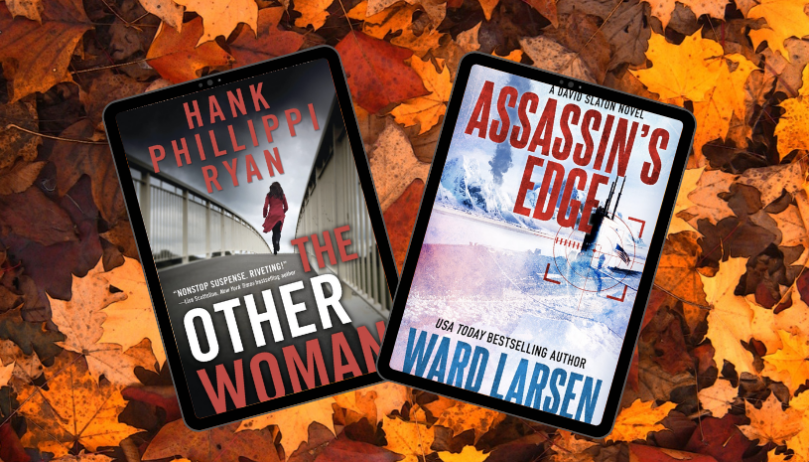
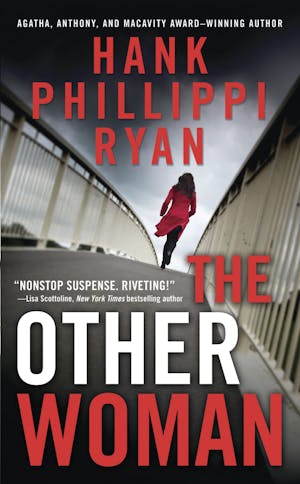
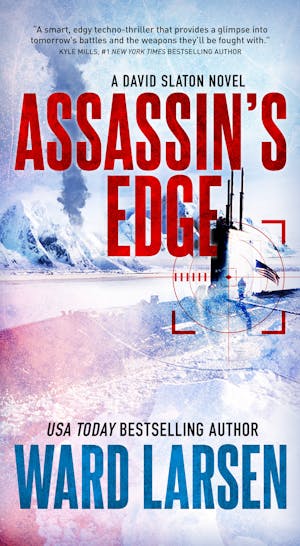
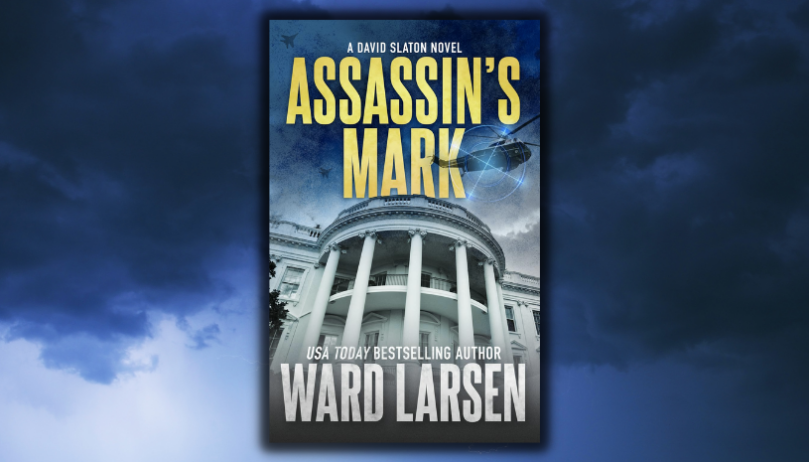
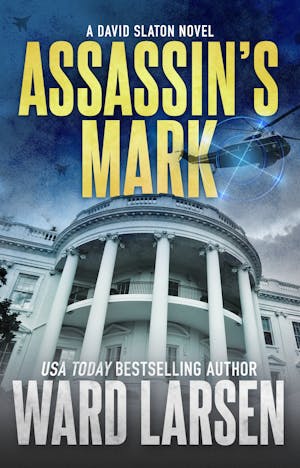 USA Today bestselling author Ward Larsen’s globe-trotting, hard-hitting assassin, David Slaton, returns for another breathless adventure, Assassin’s Mark.
USA Today bestselling author Ward Larsen’s globe-trotting, hard-hitting assassin, David Slaton, returns for another breathless adventure, Assassin’s Mark.




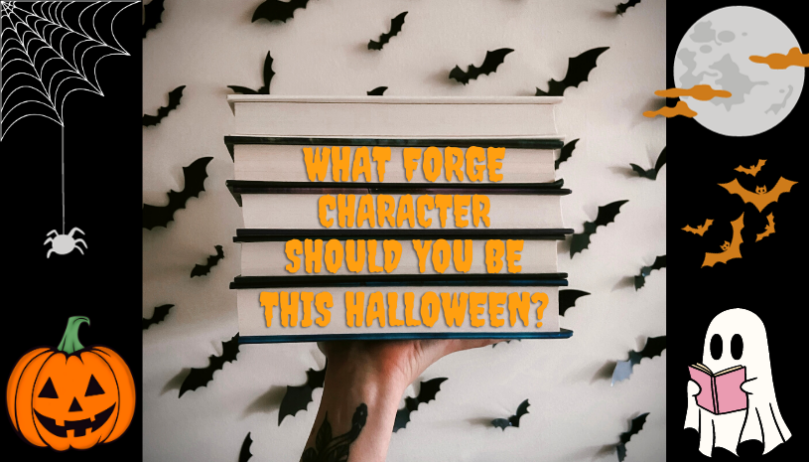
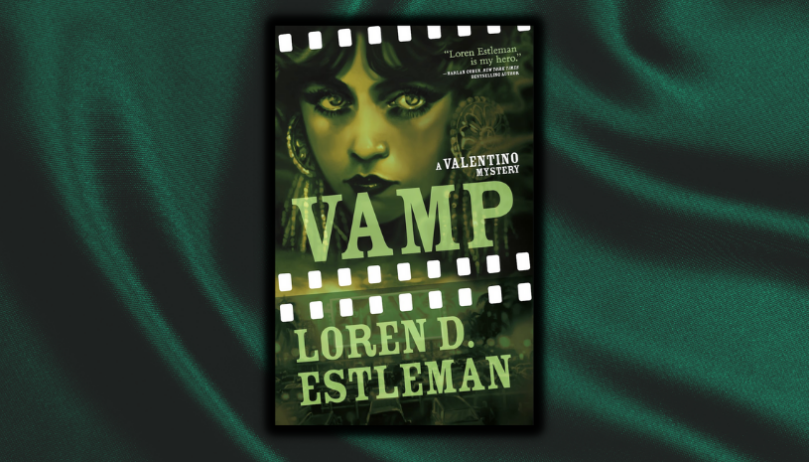
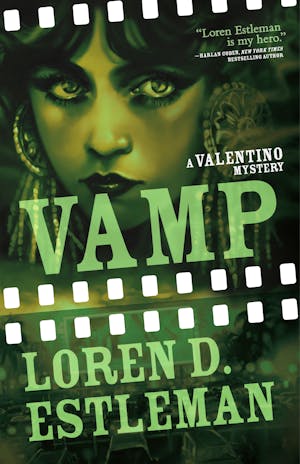


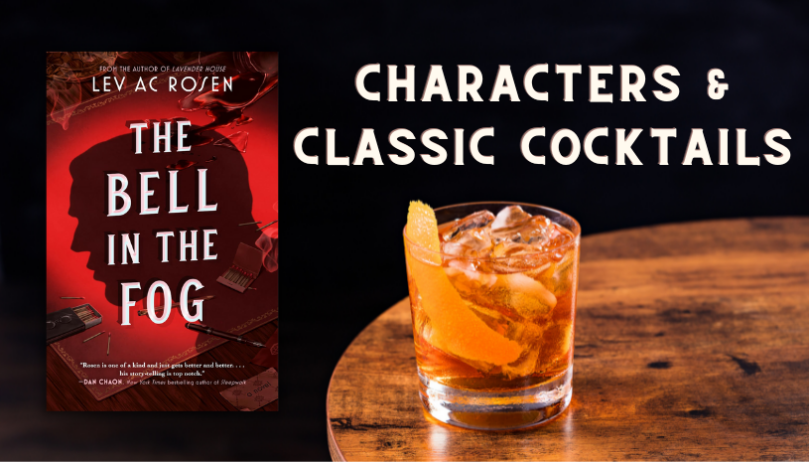
:max_bytes(150000):strip_icc():format(webp)/mint-julep-720x720-primary-5e2063b906384479b345687201992bd0.jpg)

:max_bytes(150000):strip_icc():format(webp)/__opt__aboutcom__coeus__resources__content_migration__liquor__2017__09__01105623__espresso-martini-720x720-recipe-Molly-909b41dfe98c4f49b65a319ae28dd51e.jpeg)

:max_bytes(150000):strip_icc():format(webp)/__opt__aboutcom__coeus__resources__content_migration__liquor__2018__05__08113350__bourbon-old-fashioned-720x720-recipe-ade6f7780c304999be3577e565c9bcdd.jpg)


